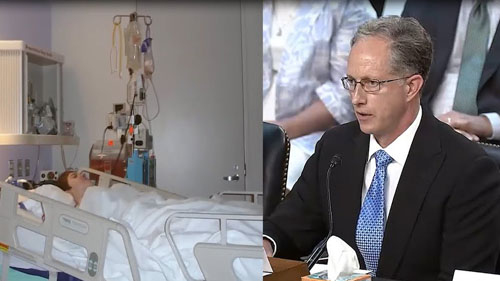| Recent Featured Videos and Articles | Eastern “Orthodoxy” Refuted | How To Avoid Sin | The Antichrist Identified! | What Fake Christians Get Wrong About Ephesians | Why So Many Can't Believe | “Magicians” Prove A Spiritual World Exists | Amazing Evidence For God | News Links |
| Vatican II “Catholic” Church Exposed | Steps To Convert | Outside The Church There Is No Salvation | E-Exchanges | The Holy Rosary | Padre Pio | Traditional Catholic Issues And Groups | Help Save Souls: Donate |  |









 " />
" /> " />
" /> " />
" /> " />
" /> " />
" />




St. Augustine and "Baptism of Desire"
St. Augustine is quoted in favor of the concept of baptism of desire, but he admittedly struggled with the issue, sometimes clearly opposing the idea that unbaptized catechumens could achieve salvation, and other times supporting it.
There are two interesting points about this passage. The first relates to baptism of blood: notice that Augustine says that his belief in baptism of blood is supported by an inference or an argument that St. Cyprian made, not anything rooted in the Tradition of the Apostles or the Roman Pontiffs. As we saw already, many of the inferences of St. Cyprian showed themselves to be quite wrong, to put it nicely, such as his “inference” that it was from “apostolic Tradition” that heretics cannot confer baptism. Thus, St. Augustine is revealing by this statement a very important point: that his belief even in baptism of blood is rooted in fallible human speculation, not in divine revelation or infallible Tradition. He is admitting that he could be wrong and, in fact, he is wrong.
Secondly, when Augustine concludes that he also believes that faith (that is, faith in Catholicism) and a desire for baptism could have the same effect as martyrdom, he says: “Considering this over and over again…” By saying that he considered this over and over again, St. Augustine is admitting that his opinion on baptism of desire is also something that he has come to from his own consideration, not through infallible Tradition or teaching. It is something that he admittedly struggled with and contradicted himself on, as will be shown. All of this serves to prove again that baptism of desire, like baptism of blood, is a tradition of man, born in erroneous and fallible human speculation (albeit from some great men), and not rooted in or derived from any Tradition of the Apostles or of the popes.
Interestingly, in the same set of works on Baptism quoted already, St. Augustine made a different error, which he later corrected in his Book of Corrections. In this set of works he had originally stated his opinion that the Good Thief who died on the Cross next to Our Lord was an example of Baptism of Blood. He later corrected this, by noting that the Good Thief could not be used as an example of Baptism of Blood because we don’t know if the Good Thief was ever baptized.[2] But actually, the Good Thief cannot be used as an example of baptism of blood primarily because the Good Thief died under the Old Law, not the New Law; he died before the Law of Baptism was instituted by Jesus Christ after the Resurrection. For that reason, the Good Thief, like the Holy Innocents, constitutes no argument against the necessity of receiving the Sacrament of Baptism for salvation.
In fact, when Our Lord said to the Good Thief, “This day you will be with Me in paradise,” Jesus was not referring to heaven, but actually to Hell. As Catholics know, no one entered Heaven until after Our Lord did, after His Resurrection. On the day of the Crucifixion, Christ descended into Hell, as the Apostles’ Creed says. He did not descend to the Hell of the damned, but to the place in Hell called the Limbo of the Fathers, the waiting place of the just of the Old Testament, who could not enter Heaven until after the Savior came.
To further prove the point that the Good Thief did not go to Heaven on the Day of the Crucifixion, there is the fact that on Easter Sunday, when Mary Magdalene met the Risen Lord, He told her, “Do not touch Me, for I have not yet ascended to My Father.”
Our Lord hadn’t even yet ascended to Heaven on the Sunday of the Resurrection. It is therefore a fact that Our Lord and the Good Thief were not in Heaven together on Good Friday; they were in the Limbo of the Fathers, the prison described in 1 Peter 3:18-19. Jesus called this place “paradise” because He would be there with the just of the Old Testament. So, as St. Augustine later admitted, he erred in trying to use the Good Thief as an example for his point. This proves again that only the dogmatic teaching of the popes are infallible, as well as the universal and constant Tradition. But St. Augustine himself in many, many places affirms the universal Tradition of the Apostles that no one is saved without the Sacrament of Baptism; and, in fact, he denied the concept that a catechumen could be saved without the Sacrament of Baptism by his desire for it numerous times.
Here we see St. Augustine completely rejecting the concept of baptism of desire. Nothing could be more clear! He says that God keeps sincere catechumens alive until their baptism, and that those who look for rewards in such unbaptized catechumens will find nothing but punishments! St. Augustine even makes it a special point to affirm that the Almighty doesn’t allow unbaptized catechumens to be killed except for a reason! Those who say that St. Augustine held to baptism of desire are, therefore, simply not being complete with the facts. They must add the qualification that he many times rejected the idea and was on both sides of the issue. Thus, the only father that the baptism of desire advocates can clearly quote in favor of the concept (Augustine) actually denied the concept of baptism of desire many times.
Here we see St. Augustine again affirming the apostolic truth that no one enters Heaven without water baptism and again explicitly denying the concept of baptism of desire, by denying that any catechumen can be freed from sin without baptism. All of this shows that baptism of desire is not the universal Tradition of the Apostles; rather, the exact opposite is the universal Tradition of the Apostles and Fathers – that no catechumen can be saved without water baptism.
[1] Jurgens, The Faith of the Early Fathers, Vol. 3: 1630.
[2] Jurgens, The Faith of the Early Fathers, Vol. 3: 69.
[3] The Catechism of the Council of Trent, p. 171.
[4] Jurgens, The Faith of the Early Fathers, Vol. 3: 1536.
[5] Jurgens, The Faith of the Early Fathers, Vol. 3: 1717.
[6] Jurgens, The Faith of the Early Fathers, Vol. 3: 1496.
[7] Quoted by Fr. Jean-Marc Rulleau, Baptism of Desire, p. 33.
Sign up for our free e-mail list to see future vaticancatholic.com videos and articles.
Recent Content
^